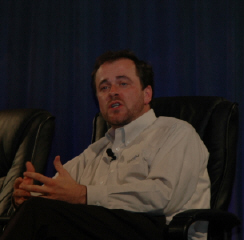Universal Navigator: The next-generation browser?


Universal Navigator is focused on three areas, Firmage said during a brief presentation the Future in Review conference. First, dealing with the data chaos created by having a billion channels; second, taking advantage of 3D-rendering found in offline game consoles to build rich media experiences; and third, a new governance model built on the public broadcasting model.
He showed off an example of an information portal about the Earth within the Universal Navigator, and said that ManyOne and partners would create other taxonomies and portals for topics such as health, sports and business. The Earth portal has rich, 3D graphics and an index for easily navigating up or down or across related topics. He showed an example of content created for the browser that combines satellite imagery and data about the recent devastating tsunami.
By the end of the decade, Firmage expects that Earth portal "will let you fly over an accurate, photo-realistic virtual Earth to explore the contours of the Grand Canyon, swim with the fish of the Great Barrier Reef and soar through the canopy with birds in the Amazon rain forest." A health portal would allow users to fly through the human body and find links selected by expert editors and the community of users. The Universal Navigator also will have tools for content creation tools accessible to users.
In a recent essay Firmage gave me, he wrote: "Imagine piloting your browser through millions of stars in our Milky Way galaxy—accurately placed—and learning, reading books, watching television programs, playing dazzling games, and talking in real time with others around the world who share your passion, regardless of language. Imagine building your own world in orbit of Alpha Centauri, and flying off to see worlds imagineered by others."
Firmage also wants the environment to be commercial-free and owned and run by the citizenry, as in public broadcasting. He came up with a novel model of taking private equity (he's looking for more funding), with a capped return on investment that will be paid out as dividends from positive cash flow. Once the investors are paid off, ManyOne is publicly owned, Firmage said. ManyOne will make a pilot version available around the end of July and ship a 1.0 version in the fall, Firmage said.
I've been following Firmage's efforts over the last several years, and his ambitious vision hasn't changed. Building all the rich media portals that map "everything we know" and catalog important links is like a super souped up Wikipedia, a free, community developed encyclopedia that is managed by a non-profit parent organization. Perhaps the two should get together and trade notes…